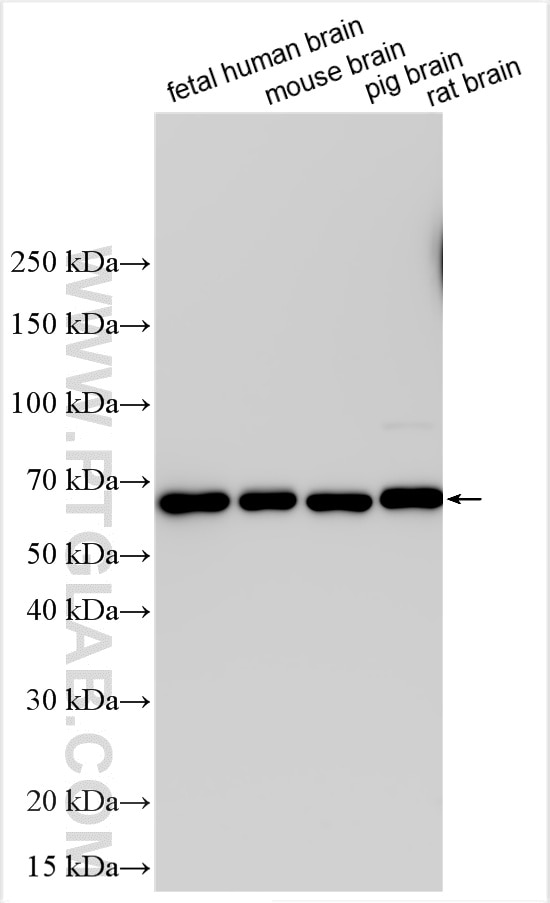Tested Applications
| Positive WB detected in | fetal human brain tissue, mouse brain tissue, pig brain tissue, rat brain tissue |
Recommended dilution
| Application | Dilution |
|---|---|
| Western Blot (WB) | WB : 1:1000-1:6000 |
| It is recommended that this reagent should be titrated in each testing system to obtain optimal results. | |
| Sample-dependent, Check data in validation data gallery. | |
Product Information
32848-1-AP targets PAK3 in WB, ELISA applications and shows reactivity with human, mouse, rat, pig samples.
| Tested Reactivity | human, mouse, rat, pig |
| Host / Isotype | Rabbit / IgG |
| Class | Polyclonal |
| Type | Antibody |
| Immunogen | PAK3 fusion protein Ag38566 Predict reactive species |
| Full Name | p21 protein (Cdc42/Rac)-activated kinase 3 |
| Calculated Molecular Weight | 62kDa,559aa |
| Observed Molecular Weight | 64 kDa |
| GenBank Accession Number | NM_001128173.2 |
| Gene Symbol | PAK3 |
| Gene ID (NCBI) | 5063 |
| Conjugate | Unconjugated |
| Form | Liquid |
| Purification Method | Antigen affinity Purification |
| UNIPROT ID | O75914 |
| Storage Buffer | PBS with 0.02% sodium azide and 50% glycerol, pH 7.3. |
| Storage Conditions | Store at -20°C. Stable for one year after shipment. Aliquoting is unnecessary for -20oC storage. 20ul sizes contain 0.1% BSA. |
Background Information
PAK3, also known as p21-activated kinase 3, is a member of the PAK family of serine/threonine protein kinases, classified as Group I PAK kinases along with PAK1 and PAK2. PAK3 is predominantly expressed in neural cells, especially in regions such as the brain. PAK3 plays a crucial role in dendritic spine development and synaptic plasticity. PAK3 plays an important role in cell migration and morphology. It regulates dynamic changes in the actomyosin cytoskeleton, microtubules, and adhesion interactions with the microenvironment. In neurons and other cell types, PAK3 contributes to cell migration, neurite growth, and dendritic spine morphogenesis by participating in signaling cascades that control cell adhesion and cell motility. Mutations in PAK3 are associated with X-linked non-syndromic intellectual disability.
Protocols
| Product Specific Protocols | |
|---|---|
| WB protocol for PAK3 antibody 32848-1-AP | Download protocol |
| Standard Protocols | |
|---|---|
| Click here to view our Standard Protocols |



